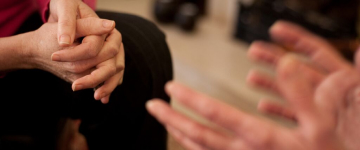The UK’s hidden struggle with anxiety symptoms
Bupa research suggests our attitudes towards anxiety are changing
Our research shows vast search increases for anxiety symptoms relating to both genders. However, the increases seen for ‘anxiety symptoms in men’ have been far more prominent than those seen for women.
13
times more searches for ‘anxiety symptoms in men’
6
times more searches for ‘anxiety symptoms in women’

Dr Pablo Vandenabeele, Clinical Lead for Mental Health, shares what these search changes suggest for the mental health landscape. We’ll also cover the different ways anxiety can present itself and why it’s so important to get help if you’re struggling.
What’s caused the search increase for anxiety symptoms?
We’ve been dealing with lots of uncertainty over the past two years – from the COVID-19 pandemic, worrying world events and the cost of living crisis. We’ve all been working hard to get through life’s various stressors, which sometimes feel out of our control.
We are more likely to feel anxious when there’s uncertainty or unease about the future. With so much to take on, it’s not surprising that we’ve seen search increases for anxiety symptoms.
However, what is surprising is the volume of search increases that we’ve seen for ‘anxiety symptoms in men’. Thirteen times more people searched for this term in August 2022 than in August 2020. During the same period, searches for ‘anxiety symptoms in women’, saw six times as many searches.
In the past, anxiety has been seen as a condition that affects females more than it does males. Research from Cambridge University1 found that women are almost twice as likely to experience anxiety as men. Other studies2 show women are much more likely to be diagnosed with an anxiety disorder than men.
Typically, men are more likely to lean on alcohol or drugs if they’re feeling anxious. Anxiety can also have a knock-on effect for how well they’re able to sleep.
Women feeling anxious often worry excessively and feel more irritable than usual. They’re also more likely to have panic attacks as a result of their anxiety. They then withdraw from friends and family.
Women can also experience sleep disruption, along with appetite changes.
Our research shows searches for ‘anxiety symptoms in men’ increased significantly from September 2021. In the following months, searches peaked to nineteen times higher than volumes seen in August 2020.
Stigmas associated with mental health can make it difficult for men to share their feelings and emotions. All too often, this can lead to men bottling up their feelings and not reaching out for support when needed. The search changes we’ve seen for male anxiety symptoms point to a promising shift in how they’re acknowledged and addressed.
During our research period, steep search increases were also seen for anxiety self-help methods. While it’s great to see that people are recognising the effects anxiety is having on them, it’s important to note how effective they are.
- ‘Anxiety ring’ 22 times as many searches
- ‘Anxiety ring spinner’ 10 times as many searches
- ‘Anxiety fidget ring’ 9 times as many searches
- ‘Anxiety drops’ 4 times as many searches
An anxiety ring is a ball bearing band worn around your finger. It’s a discrete way for many people to reduce anxiety by focussing on spinning or rotating the ball. Wearing one can help to distract you from anxious thoughts or situations, but they’ll only reduce your symptoms on a short-term basis.
Buying an anxiety ring won’t ‘cure’ your anxiety, but alongside further treatment, such as talking therapies, they can help to reduce your symptoms over a longer time.
Anxiety self-help
-
How to manage anxiety
-
Self care for anxiety
-
Anxiety: when to get help
When you’re anxious, you might feel tempted to comfort yourself with anything from stodgy food to alcohol. Coping mechanisms like these can provide a quick fix but they won’t help you in the long term. It’s important to look after your general health, which means taking care of the basics.
- A daily 15-minute walk can help to improve your mood.
- Limit your caffeine intake – lay off tea, coffee, chocolate and energy drinks.
- Eat and drink enough throughout the day – get your fruit and veg five-a-day and drink plenty of water.
- Make sure you’re getting between seven and nine hours of sleep every night.
- Use relaxation techniques, like meditation, mindfulness and worry trees.
- Try a self-help book. Reading Well is a credible source of self-help book recommendations.
- Share how you’re feeling with someone close to you – this can help you to feel understood.
- Take a look at Bupa’s Mental Health Hub for free anxiety help.
- Charities like Samaritans, Mind, YoungMinds, Mental Health Foundation and Rethink Mental Illness are all free and here to help you.
If anxiety is causing you distress, or making daily life more difficult, it’s time to speak to a GP for more advice. They may refer you for talking therapies such as cognitive behavioural therapy, depending on your symptoms.
It’s key to seek treatment at an early stage. Mental health issues can become harder to treat if you’ve had them for a long time.
What happens if you don’t get anxiety treatment?
Anxiety that isn't treated, and goes on for a long time without speaking to a health professional, can turn into other mental health conditions like depression. It can also lead to other problems such as:
- an unhealthy lifestyle
- substance abuse
- chronic pain
- social isolation
- digestive and bowel problems
If you or someone close to you has developed behavioural changes, it’s possible anxiety may be a contributing factor. This might be relying on food or alcohol more, for example. Remember that whatever you’re feeling is normal – we’ve been through a lot over the last few years.
What’s also important to remember is that it’s always OK to ask for help.
More health information about anxiety
Get the support you need with our expert-led health advice.

Support those with anxiety
10 things a friend wants you to know
Support a friend or loved one with their anxiety. Know what to say, and not to say. Get confident about how to help.

Anxiety and depression
What’s the difference between the two?
Two different conditions with similarities and overlaps. Understand more about them here.

Anxiety and getting help
You’re not alone and help is here
All things anxiety – a place to get more information and support. And you don’t need to be a Bupa customer.
1 Opinion: women are far more anxious than men – here’s the science. University of Cambridge. www.cam.ac.uk/research/discussion/opinion-women-are-far-more-anxious-than-men-heres-the-science, accessed 14 October 2022
2 McLean CP, Asnaani A, Litz BT, Hofmann SG. Gender differences in anxiety disorders: prevalence, course of illness, comorbidity and burden of illness. J Psychiatr Res. 2011 Aug;45(8):1027-35. doi:10.1016/j.jpsychires.2011.03.006.
Epub 2011 Mar 25. www.ncbi.nlm.nih.gov/pmc/articles/PMC3135672/
3 Anxiety in men: symptoms, causes and treatment. Priory. www.priorygroup.com/mental-health/anxiety-treatment/anxiety-in-men , medically reviewed April 2022
4 Anxiety in men: symptoms, causes and treatment. Priory. www.priorygroup.com/mental-health/anxiety-treatment/anxiety-in-men , medically reviewed April 2022
5 Anxiety in women. Priory. www.priorygroup.com/mental-health/anxiety-treatment/anxiety-in-women, medically reviewed February 2022
6 Anxiety in women. Priory. www.priorygroup.com/mental-health/anxiety-treatment/anxiety-in-women, medically reviewed February 2022


